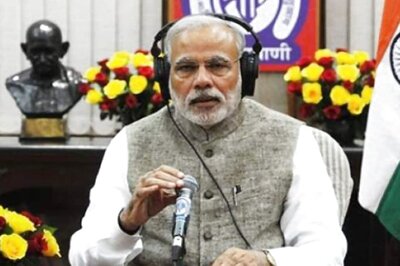
views
THIRUVANANTHAPURAM: The Government decision to vaccinate lakhs of children in the state with the pentavalent vaccine from October has kicked up a lot of heat and dust not just in matters concerned with safety, but also with regard to economics of vaccine delivery.The pentavalent, by combining vaccines for regular diphtheria, pertussis, tetanus (DPT), hepatitis B and also the vaccine against Haemophilus influenzae type b (Hib), has been hailed for the reduction in the total number of shots for the babies and indirectly the equipment used, such as the vials for storage and syringes.The introduction of the vaccine in the immunisation programme is also predicted to give the private hospitals a run for their money as the pentavalent vaccines are now being sold at the private hospitals at a humongous cost. By the time a child completes the mandatory doses, his parent would have shelled out anything between Rs 2,500 to Rs 5,000, depending on the hospital.The actual cost of the vaccine varies from Rs 350 to Rs 550 for a single dose, which the Serum Institute of India has brought it down to Rs 100 per dose for the national programme.Dr K V Babu from Payyannur, who retrieved a number of documents relating to the vaccination programme through RTI, said that the unmonitored price of vaccine in the private sector could probably be one reason why the Government thought of introducing the pentavalent in the National Immunisation Programme.Once the Government initiates the programme, the immunisation will be free of cost, said Additional Director of Health Services Dr P K Jameela. While this would obviously land the private hospitals in a position of disadvantage, it might also take away the option of the parents to choose between the regular DPT and the pentavalent.“Our hospital, like most others, now give the option of choosing between the expensive and relatively-inexpensive modes of immunisation. Once this is introduced by the Government, there is every chance that the private hospitals will stop doing that and provide only the expensive one. They can always justify themselves by saying that this is what is available in the Government sector too,” said a leading gynaecologist in the city. The pentavalent vaccine, preferred by the techies and all those who are short on time, has raised a whole lot of safety concerns too.“A vaccine has to be introduced if it is good and effective. But just the fact that it is being used in the private hospitals should not be the reason for including it in the National Immunisation Programme. In fact it is a ploy used by vaccine manufacturers to first introduce it in the private hospitals, gain acceptance and then get into the national programmes. There has not been a single scientific study on the effectiveness or the impact,” said Dr K V Babu.And even while Dr Jameela claimed that the vaccine was safe and approved by the WHO, it could seen that concerns on safety had been raised in the meeting of the National Advisory Group on Immunisation as well. Dr Babu opined that such a pilot programme on a vaccine which has had no impact study yet, should have been first introduced in Delhi where adverse effects could be easily managed by a Central team rather than in Kerala or Tamil Nadu, where the pilot programme will begin in a couple of months.




















Comments
0 comment